新应用大学英语3教案第一单元
- 格式:doc
- 大小:81.00 KB
- 文档页数:13
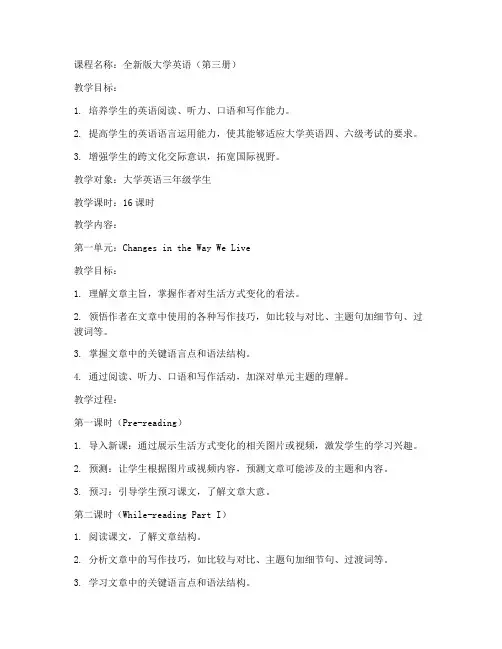
课程名称:全新版大学英语(第三册)教学目标:1. 培养学生的英语阅读、听力、口语和写作能力。
2. 提高学生的英语语言运用能力,使其能够适应大学英语四、六级考试的要求。
3. 增强学生的跨文化交际意识,拓宽国际视野。
教学对象:大学英语三年级学生教学课时:16课时教学内容:第一单元:Changes in the Way We Live教学目标:1. 理解文章主旨,掌握作者对生活方式变化的看法。
2. 领悟作者在文章中使用的各种写作技巧,如比较与对比、主题句加细节句、过渡词等。
3. 掌握文章中的关键语言点和语法结构。
4. 通过阅读、听力、口语和写作活动,加深对单元主题的理解。
教学过程:第一课时(Pre-reading)1. 导入新课:通过展示生活方式变化的相关图片或视频,激发学生的学习兴趣。
2. 预测:让学生根据图片或视频内容,预测文章可能涉及的主题和内容。
3. 预习:引导学生预习课文,了解文章大意。
第二课时(While-reading Part I)1. 阅读课文,了解文章结构。
2. 分析文章中的写作技巧,如比较与对比、主题句加细节句、过渡词等。
3. 学习文章中的关键语言点和语法结构。
第三课时(While-reading Part II-III)1. 继续阅读课文,加深对文章主题的理解。
2. 分析文章中的写作技巧,如比较与对比、主题句加细节句、过渡词等。
3. 学习文章中的关键语言点和语法结构。
第四课时(Post-reading)1. 比较与对比:引导学生对比文章中提到的不同生活方式,分析其优缺点。
2. 写作:让学生根据文章内容,写一篇关于生活方式变化的短文。
第二单元:Active Reading教学目标:1. 理解文章主旨,掌握作者对大学生活的描述。
2. 学习作者在文章中使用的写作技巧,如情景描写、人物刻画等。
3. 掌握文章中的关键语言点和语法结构。
4. 通过阅读、听力、口语和写作活动,加深对单元主题的理解。

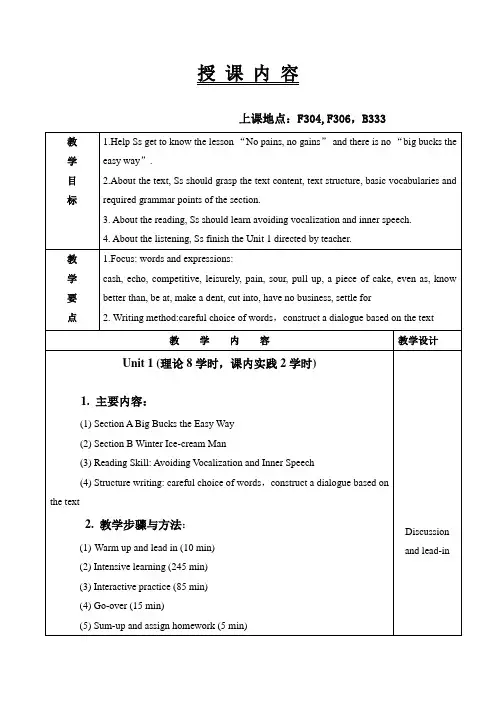
授课内容上课地点:F304,F306,B333When they are excited, angry, upset and the like.2.what does “magazine sections” mean?Parts of magazines, 8 or 12 pages long.3.how many steps are there in the process before delivering?Five: take out, roll, slip, band and slide.Lines 51-661.what do you think of the father’s answer?Clever and sensible. It is a lie, a harmless lie, one told in order to avoid upsetting somebody.2.why did the father say “That’s encouraging”?the sons were learning how to solve the problem of manpower shortage;they hired other people to help, and learnt to improve efficiency by establishing assembly lines.3.why did the mother say “it is very discouraging”?the measures weren’ working at all.Lines 67-771.what do you think of the father’s bonus program?It is reasonable and logical. Bonus is a popular incentive that management adopts. Sometimes we have to lose something in order to gain something. If you are reluctant to use a small bait, you can hardly get a big fish.2.did the son understand that at first thought?No. he thought the more the workers got, the less he obtained.3.why did the son answer “Yes, Sir”?he had come to realize it was a business and he took the father’s instructions as and order.Lines 78-861.what does “see the color of cash” mean?See Note 7 in your text book.2.what’s the difference between the original payment and the demanded one?The original payment was five dollars per person, shile now they demanded five dollars per hour.3.who probably played the mediating role?The mother.Lines 87-94Why did the son think it “enough”?No matter how much, it was the money they made by themselves with great efforts and they learnt a lot from the experience.Lines 95-1091.what did the youngest sons learn from their college brothers?。

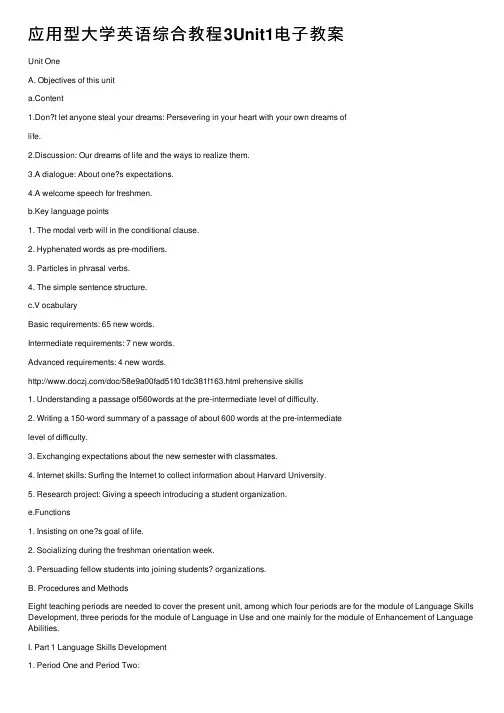
应⽤型⼤学英语综合教程3Unit1电⼦教案Unit OneA. Objectives of this unita.Content1.Don?t let anyone steal your dreams: Persevering in your heart with your own dreams oflife.2.Discussion: Our dreams of life and the ways to realize them.3.A dialogue: About one?s expectations.4.A welcome speech for freshmen.b.Key language points1. The modal verb will in the conditional clause.2. Hyphenated words as pre-modifiers.3. Particles in phrasal verbs.4. The simple sentence structure.c.V ocabularyBasic requirements: 65 new words.Intermediate requirements: 7 new words.Advanced requirements: 4 new words./doc/58e9a00fad51f01dc381f163.html prehensive skills1. Understanding a passage of560words at the pre-intermediate level of difficulty.2. Writing a 150-word summary of a passage of about 600 words at the pre-intermediatelevel of difficulty.3. Exchanging expectations about the new semester with classmates.4. Internet skills: Surfing the Internet to collect information about Harvard University.5. Research project: Giving a speech introducing a student organization.e.Functions1. Insisting on one?s goal of life.2. Socializing during the freshman orientation week.3. Persuading fellow students into joining students? organizations.B. Procedures and MethodsEight teaching periods are needed to cover the present unit, among which four periods are for the module of Language Skills Development, three periods for the module of Language in Use and one mainly for the module of Enhancement of Language Abilities.I. Part 1 Language Skills Development1. Period One and Period Two:●Step One: StarterA. Read the lyrics of a song. Listen to the tape or the CD and sing in chorus. Ask thestudents to listen to the song and understand the general meaning of it. Then ask some questions related to the song and then shift to Part B.B. Listen to a short passage entitled “My Dream” and answer the questions.Before playing the tape, the instructor can ask the students to take a look at the three questions first. Then the instructor tells the students to listen to the passage with the questions in mind. After listening to the passage, ask the students to answer the questions.This step shall take up 10-15 minutes.●Step Two: New words and expressionsGo over the key words and expressions in the text (refer to Student?s Book Pages 5-7) to prepare students for the text learning.The time for this step should not exceed 10 minutes.●Step Three: Text teachingStart teaching the text: Don?t let anyone steal your dreams. Before delving into the text, ask students a general question about the text such a s “How come one can steal your dream? Isn?t a dream something in your head that no one can touch?”Then start the detailed study of the text and go through the text paragraph by paragraph. Help students understand the story and explain language points meanwhile.After that the text organizational chart will be presented so that the students can expand each episode.Then start the detailed study of the text and go through the text paragraph by paragraph. To help students understand the story, the instructor can explain the language points and ask students to answer the questions related to the text.This step shall not take up more than one and a half periods.2.I have a friend named Monty Roberts who owns a horse ranch in San Ysidro. 我有个朋友叫蒙蒂·罗伯兹,他在圣伊斯德罗有个牧马场。

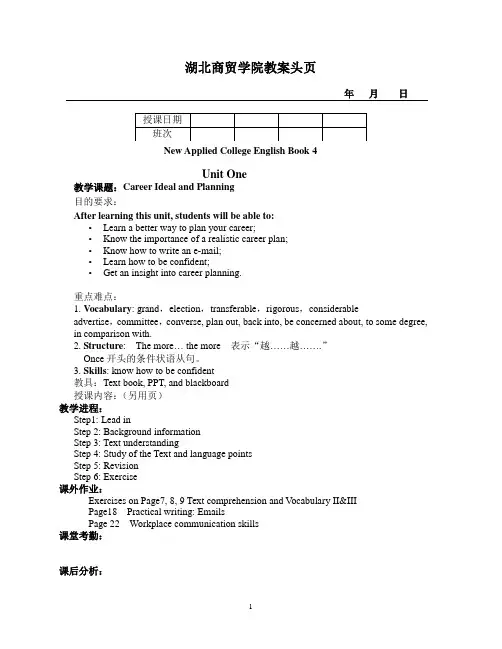
湖北商贸学院教案头页年月日New Applied College English Book 4Unit One教学课题:Career Ideal and Planning目的要求:After learning this unit, students will be able to:•Learn a better way to plan your career;•Know the importance of a realistic career plan;•Know how to write an e-mail;•Learn how to be confident;•Get an insight into career planning.重点难点:1. Vocabulary: grand,election,transferable,rigorous,considerableadvertise,committee,converse, plan out, back into, be concerned about, to some degree, in comparison with.2. Structure: The more… the more 表示“越……越…….”Once开头的条件状语从句。
3. Skills: know how to be confident教具:Text book, PPT, and blackboard授课内容:(另用页)教学进程:Step1: Lead inStep 2: Background informationStep 3: Text understandingStep 4: Study of the Text and language pointsStep 5: RevisionStep 6: Exercise课外作业:Exercises on Page7, 8, 9 Text comprehension and V ocabulary II&IIIPage18 Practical writing: EmailsPage 22 Workplace communication skills课堂考勤:课后分析:1. Teaching ObjectiveAfter learning this unit, students will be able to:•Learn a better way to plan your career;•Know the importance of a realistic career plan;•Know how to write an e-mail;•Learn how to be confident;•Get an insight into career planning.2. Key Points1) Vocabulary: grand,election,transferable,rigorous,considerableadvertise,committee,converse, plan out, back into, be concerned about, to some degree, in comparison with.2) Structure: The more… the more……表示“越……越…….”Once开头的条件状语从句。
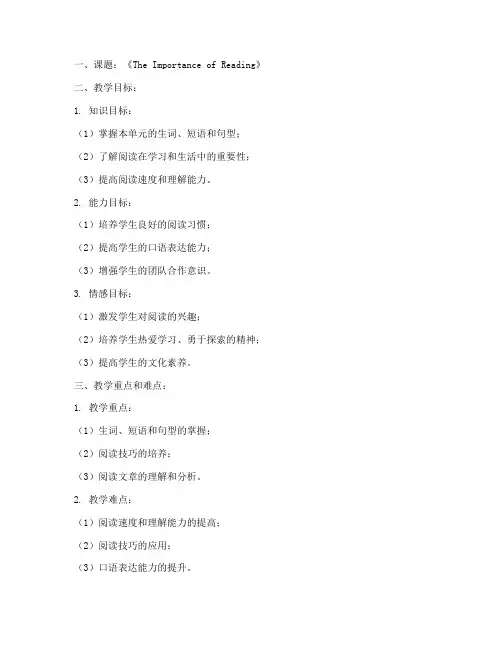
一、课题:《The Importance of Reading》二、教学目标:1. 知识目标:(1)掌握本单元的生词、短语和句型;(2)了解阅读在学习和生活中的重要性;(3)提高阅读速度和理解能力。
2. 能力目标:(1)培养学生良好的阅读习惯;(2)提高学生的口语表达能力;(3)增强学生的团队合作意识。
3. 情感目标:(1)激发学生对阅读的兴趣;(2)培养学生热爱学习、勇于探索的精神;(3)提高学生的文化素养。
三、教学重点和难点:1. 教学重点:(1)生词、短语和句型的掌握;(2)阅读技巧的培养;(3)阅读文章的理解和分析。
2. 教学难点:(1)阅读速度和理解能力的提高;(2)阅读技巧的应用;(3)口语表达能力的提升。
四、教学过程:1. 导入新课(1)教师用英语进行自我介绍,引导学生进行自由交流;(2)教师提出问题,引导学生思考阅读的重要性。
2. 预习生词(1)教师带领学生预习本单元的生词,并解释词义;(2)学生跟读生词,教师纠正发音。
3. 阅读课文(1)教师带领学生快速阅读课文,了解文章大意;(2)学生朗读课文,教师纠正发音和语调;(3)教师提问,检查学生对课文内容的理解。
4. 深入阅读(1)教师引导学生分析课文结构,总结文章主旨;(2)学生分组讨论,分享对课文的理解和感悟;(3)教师总结各组的讨论成果,强调阅读技巧。
5. 练习与应用(1)学生完成课后练习,巩固所学知识;(2)教师讲解练习中的难点,帮助学生掌握阅读技巧;(3)学生进行口语练习,提高口语表达能力。
6. 课堂小结(1)教师总结本节课的重点内容,强调阅读的重要性;(2)学生分享自己的阅读心得,激发对阅读的兴趣;(3)布置课后作业,巩固所学知识。
五、教学方法和手段:1. 教学方法:启发式教学、讨论式教学、互动式教学;2. 教学手段:多媒体教学、板书教学、课堂练习。
六、教学反思:本节课通过多种教学方法和手段,引导学生掌握阅读技巧,提高阅读速度和理解能力。
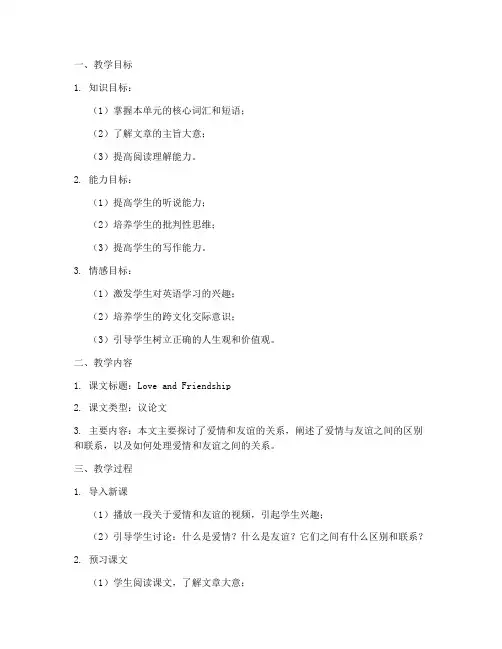
一、教学目标1. 知识目标:(1)掌握本单元的核心词汇和短语;(2)了解文章的主旨大意;(3)提高阅读理解能力。
2. 能力目标:(1)提高学生的听说能力;(2)培养学生的批判性思维;(3)提高学生的写作能力。
3. 情感目标:(1)激发学生对英语学习的兴趣;(2)培养学生的跨文化交际意识;(3)引导学生树立正确的人生观和价值观。
二、教学内容1. 课文标题:Love and Friendship2. 课文类型:议论文3. 主要内容:本文主要探讨了爱情和友谊的关系,阐述了爱情与友谊之间的区别和联系,以及如何处理爱情和友谊之间的关系。
三、教学过程1. 导入新课(1)播放一段关于爱情和友谊的视频,引起学生兴趣;(2)引导学生讨论:什么是爱情?什么是友谊?它们之间有什么区别和联系?2. 预习课文(1)学生阅读课文,了解文章大意;(2)教师讲解生词、短语和句型。
3. 阅读理解(1)学生朗读课文,注意语音、语调;(2)教师提问,检查学生对课文内容的理解;(3)小组讨论,分析文章结构,归纳中心思想。
4. 课堂活动(1)角色扮演:将学生分成若干小组,每组选择一个场景,进行角色扮演,模拟文章中的情景;(2)辩论赛:针对文章中的观点,组织学生进行辩论,培养学生的批判性思维。
5. 课堂小结(1)教师总结本节课的重点内容;(2)布置课后作业,巩固所学知识。
6. 课后作业(1)翻译课文中的难句;(2)写一篇关于爱情和友谊的短文;(3)阅读课外书籍,了解更多关于爱情和友谊的知识。
四、教学评价1. 课堂表现:观察学生在课堂上的参与度、发言情况等;2. 作业完成情况:检查学生的课后作业,了解学生对本节课知识的掌握程度;3. 期末考试:通过考试检验学生对本单元知识的综合运用能力。
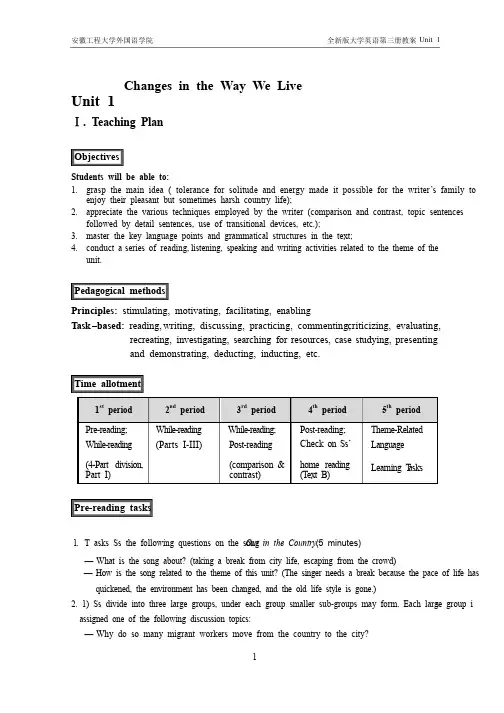
Unit 1 Changes in the Way We LiveⅠ. Teaching Plan Objectives Students will be able to: 1. grasp the main idea ( tolerance for solitude and energy made it possible for the writer’s family to enjoy their pleasant but sometimes harsh country life); 2. appreciate the various techniques employed by the writer (comparison and contrast, topic sentences followed by detail sentences, use of transitional devices, etc.); 3. master the key language points and grammatical structures in the text; 4. conduct conduct a a series series of reading, of reading, listening, listening, speaking speaking and and writing writing activities activities related related to to the the theme theme of of the the unit. Pedagogical methodsPrinciples: stimulating, motivating, facilitating, enabling Task –based: reading, writing, discussing, practicing, commenting, criticizing, evaluating, recreating, recreating, investigating, investigating, searching searching for for resources, resources, case case studying, studying, presenting presenting and demonstrating, deducting, inducting, etc. Time allotment1st period 2nd period 3rd period 4th period 5th period Pre-reading; While-reading (4-Part division, Part I)While-reading (Parts I-III) While-reading; Post-reading (comparison & contrast) Post-reading; Check Check on on Ss’Ss’ home reading (T (Text B)ext B) Theme-Rel Theme-Related ated Language Learning T asks Pre-reading tasks1. T asks Ss the following questions on the song Out in the Country: (5 minutes)— What is the song about? (taking a break from city life, escaping from the crowd) — How is the song related to the theme of this unit? (The singer needs a break because the pace of life has quickened, the environment has been changed, and the old life style is gone.) 2. 1) Ss divide into three large groups, under each group smaller sub-groups may form. Each large group i s assigned one of the following discussion topics: — Why do so many migrant workers move from the country to the city? — Why do city people buy apartments or houses in the suburbs, even in the countryside? — Why are tours of Zhou Zhuang (周庄), Li Jiang (丽江) or any other old towns so popular? Why are tourists willing to pay to spend a day in a farmer’s house?2) After the discussion, speakers of some sub-groups report to class. 3) T may sum up like like this:this: People change their p laces of places of living because they l ook for things that look for things that their previous life i s unable to provide. However, once life has been changed, they miss the good old days. (20 minutes)3. Ss do Cloze B in after-text exercises to learn about Americans’ ideal of a country life. Then T leads in to the study of Text A. (10 minutes) While-reading tasks1. T tells Ss how to divide the text into four parts, and that they are to sum up the main idea of each part as they read along (see Text Organization Exercise 1). (2 minutes)2. Ss read the first sentences of Paras 1-3 and sum up the main idea of this part. (3 minutes)3. T explains language points in this part part and gives Ss practice (see and gives Ss practice (see Language Study ). (15 min-utes) 4. T explains language points in Part II and gives Ss practi ce (see Language Study ). (20 minutes)5. Ss re-read Part II and make a summary of each paragraph in it. T writes down their summaries on the blackboard. Then, based based on on paragraph paragraph summaries, Ss will summaries, Ss will c ome up with come up with a a summary summary of of Part Part II.II. (8 minutes)6. Ss read the first sentences of Paras 8—11 and sum up the main idea of this part. (3 minutes) 7. T explains the language points in this part and gives Ss practice (see Language S tudy ). (20 minutes) 8. T explains language points in Part IV and gives Ss practice (see Language Study ). (20 minutes) 9. Ss find out the two special qualities that make a country life possible. (2 minutes)Post-reading tasks1. 1) Ss work in pairs to finish Text Organization Exercise 2. Later some of them may report to class. 2) T guides Ss through W r iting Strategy. riting Strategy. 3) T urges Ss to use comparison and contrast more effectively in their own writing. (15 minutes) 2. 2. 1) T 1) T asks Ss to re-read Para 2 and analyze the relationship among its sentences (one topic sentence —“It’s a self -reliant sort of life.”— followed by three detail sentences). 2) Ss re-read the rest of the text to find similar patterns. Then they would report their findings to class (see T ext Analysis ). 3) T encourages Ss to model their own writing after this pattern. (15 minutes) 3. T guides Ss through some after-text exercises. (25 minutes)4. T checks on Ss’ home reading. (3 minutes)5. Ss do Part IV : Theme-Related Language Learning Tasks. (1 period)6. T asks Ss to prepare for the next unit: (2 minutes)1) do the pre-reading task; 2) preview Text A . Ⅱ. Text Analysis The author writes his piece in a clear and logical way. In many instances he employs the pattern of “one topic sentence + several detail sentences” structure. It’s easy for readers to grasp the main idea, and it is also proven effective for learner writers like our students. Sometimes the the detail detail sentences run run parallel parallel to to each each other, other, like like those those in in Para Para 2. 2. In In some some other other paragraphs the detail sentences have their own hierarchy . Take Para 5 for example. The fi rst sentence tells how busy “I” am. The second sentence states that Sandy , the wife, is also busy. The final sentence i s a kind of summary summary——nobody can relax. Y e t following the second sentence there are a few more detail sentences showing et following the second sentence there are a few more detail sentences showing exactly how tight a schedule Sandy has. Take Paras 12-13 for an other example. The topi c sentence therein i s “I suspect not everyone who loves the country would be happy living the way we do. It takes a couple of special qualities.” Then there are two sub -topic sentences:sentences: “One i “One is a tolerance for solitude”; “T he other requirement i s energy energy—a lot of it.” Each sub —a lot of it.” Each sub-topic sentence has its own supporting details. Sometimes Sometimes there there is no is no transitional transitional devices devices between between detail sentences, sometimes detail sentences, sometimes t here there are, are, the the most most frequently used one of which is time words or phrases. For example, the detail sentences in Para 4 begi n with “three months ago”, “three months from now”, “recently”, and “later thi s month”, respectively. To be sure, other conjunctions scatter the text, like “first”- “then” -”then” - “eventually” in Para 7.Ⅲ. Cultural Notes 1. the countryside: The countryside of Britain is well known for its beauty and many contrasts: its bare mountains mountains and and moorland, moorland, its its lakes, rivers lakes, rivers and woods, and and its its long, long, often wild often wild coastline. coastline. Many Many of of the the most beautiful areas are national parks and are protected from development. When British people think of farmland, as well as open spaces, they imagine cows or sheep in green fields enclosed by hedges or stone walls, and fields of wheat and barley . Many people associate the countryside wi th peace and relaxation. They spend their free ti me walking or cycling there, or go to the country for a pi cnic or a pub lunch. Only a few people who live in the country work on farms. Many commute to work in towns. Many others dream of living in the country , where they believe they would have a better and healthier lifestyle. America America has many has many areas of wild and beautiful scenery scenery, and there , and there a re are many areas, many areas, especially especially in in the the West West in states in states like like Montana and Montana and W yoming, where few people live. live. In In the the New New England England states, such as states, such as V ermont and New Hampshire, it i s common to see small farms surrounded by hills and green areas. In Ohio, Indiana, Illinois and other Midwestern states, fields of corn or wheat reach to the horizon and there are many miles between towns. Only about 20% of Ameri cans live outside cities and towns. Life may be diffi cult for people who live in the country . Services like hospitals and schools may be further away, and going shopping can mean driving long distances. Some people even have to drive from their homes to the main road where their mailis left in a box. In spite of the disadvantages, many people who live in the country say that they like the safe, clean, attractive environment. But their children often move to a town or city as soon as they can. As in Britain, Americans like to go out to the country at weekends. Some people go on camping or fishing trips, others go hiking in national parks. 2. Fahrenheit scale: a scale of temperature, first established by the German physicist Gabriel Fahrenheit in 1715. The uni t of temperature i s the degree Fahrenheit (°F), and 0°F was originally the coldest F was originally the coldest temperature Fahrenheit could achieve using a freezing mixture of salt and i ce. On hi s scale, water freezes at 32°32°F and boils at 212°F and boils at 212°F (under set atmospheric conditions). No longer used in scientific work, Fahrenheit temperatures still feature feature in in everyday everyday language; language; hot days hot days “in “in the the eighties”, for eighties”, for example. example. To convert To convert a Fahrenheit temperature to Celsius (centigrade), subtract 32, then multiply by 5/9.3. Celsius scale: a scale of of hotness, hotness, or or temperature, temperature, first first established established by by the the Swedish scientist Swedish scientist Anders Celsius (1701-1744) in 1742. On this scale, the unit of temperature i s the degree Celsius (°C); water freezes at 0°C and boils at 100°C (under agreed standard atmospheri c conditions), although when Celsius originally devised the scale he made 0° the boiling-point and 100° the freezing-point. The Cel sius scale was formerly commonly known known as as the the centigrade centigrade scale scale because because of of the the 100 100 divisions divisions between the the freezing- freezing- and boiling-points of water. To convert from degrees Celsius to degrees Fahrenheit multiply by 9/5 and add 32.4. Ivy League: e ight long-established colleges and universities in the United States wi eight long-established colleges and universities in the United States wi th prestigious academi academic c and and social social reputations. reputations. Members Members of of the the Ivy Ivy League League are are Brown Brown University University in in Providence, Providence, Rhode Rhode Island; Island; Columbia Columbia University University in in New New Y Y ork ork City; City; Cornell Cornell University University in Ithaca, in Ithaca, New New Y Y ork; Dartmouth College College in in Hanover, New Hampshire; Harvard University in Cambridge, Massachusetts; University of Pennsylvania in Philadelphia; Princeton University in Princeton, New New Jersey; Jersey; and Y ale University in New Haven, Connecticut. The members of the Ivy League compete in intercollegiate athleti cs. 5. Sports Illustrated: a a popular popular US sports US sports magazine magazine published published each week each week by Time Inc, Inc, part part of Time of Time W arner. It first appeared appeared in in 1954, 1954, and and is read mainly is read mainly b y men. The by men. The m agazine magazine also publishes also publishes the Sports Illustrated Sports Almanac every year.6. Individual Individual Retirement Account Retirement Account (IRA): a a US US government government plan plan that that allows allows people to people to put put part part of of thei thei r income into special bank accounts. No tax has to be paid on this money until they retire.7. Buying Insurance: P eople face many choices when buying insurance poliPeople face many choices when buying insurance poli cies. They commonly choose an insurance insurance provider provider based based on on several several criteria. criteria. Some Some of of the the most most important important of of these these include: include: 1) 1) the the financial financial stability of the insurance company stability of the insurance company, 2) the pri ce of policies, and 3) details of coverage and servi ce. Only a financially sound company can fulfill its promise to pay in all circumstances. Companies with proven records of stability can provide insurance security . Choi ce of a provider based solely on pri ce, on the the other other hand, may result hand, may result i n poor servi in poor servi ce ce and coverage, and coverage, even even if the if the provider provider adverti advertises comprehensive ses comprehensive coverage and high quality servi ce. Policy prices vary significantly among companies, but competition usually forces most companies’ companies’ pri prices ces into into a narrow a narrow range. The greater cost of some policies policies may pay may pay off off in in the the long long run run through through better better protection. protection. Thus, Thus, a a detailed detailed examination examination of of coverage coverage in in policies policies provided provided by by di di fferent, well-regarded companies can h elp consumers make the help consumers make the best choi c e ce based on based on the risks they they face, face, theitheir r needs, and their finances. People seeking to buy insurance often use the servi ces of an insurance agent or broker to assist in their purchase. Most insurance falls into four main categories, according to what it covers: 1) property and casualty , 2) life, 3) health and disability, and 4) old-age and unemployment. Insurers commonly refer to insurance purchased by individual individuals s as as personal personal lines coverage and and to to insurance purchased by businesses as commercial coverage. Ⅳ. Language Study 1. 1. get get by:by: be be good good enough enough but but not not very very good; good; manage manage to to live live or or do do things things in in a a satisfactory satisfactory way way Examples: My parents managed to get by on a small amount of money. It is a little bit difficult for the old couple to get by on such a small pension.We can get by with four computers at the moment, but we’ll need a couple more when the new staff members arrive. 2. ... when when it it was was 30 30 below: below: Here Here the the Celsius Celsius scale scale is is used used instead instead of of the the Fahrenheit Fahrenheit scale, scale, (see (see Cultural Notes )3. haul: 1) transport, as with a truck, cart, etc.Examples: The farmers haul vegetables to the market on a truck every morning. The rescue team hauled medical supplies and food to the flooded villages. 2) pull or drag sth. with effort or force Examples: A crane had to be used to haul the car out of the stream. Rescue workers hauled passengers out of the crashed train. 4. 4. improvement: improvement: the act or an instance of improving or being improved Examples: Internet Internet service service providers providers should should develop security improvement services services for for their customers. The government’s priorities will go to local transport improvement projects. The improvement in the job market in the past few years has been remarkable. 5. 5. supplement: supplement: add to sth. in order to improve it (followed by with) Examples: Peter does occasional freelance work to supplement his income. The doctor suggested supplementing my diet with vitamins E and A.6. 6. indoor: indoor: situated or used inside a building Examples: Indoor pollution has been found to be as much as five to ten times higher inside some skyscrapers than outside. Tobacco smoke is considered as an indoor pollutant. The Mall of America, the biggest mall in USA includes the world’s largest indooramusement park. 7. 7. spray: spray: force out liquid in small drops upon (followed by with) Examples: I’ll have to spray the roses with insecticide to get rid of the greenfly. A car went past and sprayed me with water. 8. 8. pursue: pursue: follow Examples: After After graduation graduation Martin Martin chose chose to to pursue pursue the the same career same career as as his father his father as as a a minister. minister. College students are advised to pursue a wide range of subjects. Public evening classes allow people to earn a living during the day and pursue voca-tional and intellectual interests in their spare time. 9. 9. stack:stack: make into a pile Examples: Once the last few people had left the hall, the caretakers began stacking the chairs. Before Before being being processed processed into into lumber, lumber, the the wood wood must must be carefully be carefully stacked stacked to to prevent prevent warping. 10. wicked: e vil or bad evil or bad Examples: I would rather starve in a ditch than accept the fortune upon such wicked terms. We are all born good, but can be taught to be wicked. 11. get through: come successfully to the end Examples: The The local local government government has has taken taken some some measures measures to to ensure ensure that that all all the the people people will will get get through the winter. She got through the entrance examination and was accepted by the college.12. at that point: at that very moment, right then Examples: The train was now only a couple of yards from the kids on the track. At that very point, Anthony threw himself forward and pulled them clear . The man suddenly held up a poster. At that point, all TV cameras were pointed at him. 13. on balance: with all things considered Examples: I think, on balance, I didn’t treat you unfairly.On balan ce, it’s probably not advisable to change the company’s name.14. illustrate: p rovide with visual features; clarify by use of examples, etc. provide with visual features; clarify by use of examples, etc. Examples: Let me use another example to illustrate this difficult point. The editor has illustrated the book with black-and-white photographs. 15. I’m not making anywhere near as much money as I did ...: Iam not earning as much money as I did ...16. generate: bring into existence, produceExamples: The widespread use of Spanish in some American cities has generated a public debate over language use in the country. Space Space technology technology has has generated generated thousands thousands of of products products for for everyday everyday use use such such as as lightweight materials used in running shoes. 17. insurance: a guarantee that you will receive money if something is lost or damaged, or have repairs a guarantee that you will receive money if something is lost or damaged, or have repairs paid for, by a financial company in return for regular payments you make to them Examples: Many nations have some form of compulsory unemployment insurance. People People regularly regularly buy buy insurance insurance to to reduce reduce uncertainty uncertainty and and to to protect protect themselves themselves from from future disasters. 18. pick up: be ready to pay Examples: If he loses the case, Michael will have to pick up the bill for legal costs. Taxpayers will be picking up the tab for the improved public transport network. 19. minor: l esser or smaller in amount or importance, etc. lesser or smaller in amount or importance, etc. Examples: The Ford Company made only minor changes to the Model T for nearly two decades. They only encountered minor problems in their first space flight. 20. premium: a sum of money that you pay regularly to an insurance company for an insurance policy a sum of money that you pay regularly to an insurance company for an insurance policy Examples: The The employers employers make the make the employees employees pay pay for for a a large large portion portion of of their their health health insurance insurance premium. Some Some people people are are complaining complaining that that car car insurance insurance premiums premiums have have increased increased too too much much this year. 21. aside from: except for; in addition to (more usual in American English; same as apart from) Examples: Aside from an occasional game of tennis, he doesn’t take any exercise.This essay is good aside from a couple of spelling mistakes. They were going to have other expenses, aside from the school fees. 22. cut back: r educe in size or amount (used in the patterns: reduce in size or amount (used in the patterns: cut back sth.; cut back on sth.) Examples: There is a growing movement to cut back the government’s role in agriculture and to reduce subsidies paid to farmers. The government has cut back on defense spending. 23. lower: m ake or become smaller in amount, degree, etc. make or become smaller in amount, degree, etc. Examples: Increasing your intake of fruits and vegetables can lower your risk of getting some types of cancer. Governments may raise or lower taxes to achieve social and economic objectives. 24. dine out: eat a meal away from home (usu. in a restaurant) Examples: With the improvement of living standards, more people dine out at weekends. It’s my daughter’s birthday today, so we’re dining out tonight.25. patronize: g o to as a customer go to as a customer Examples: When he was a student, Sterling often patronized the little restaurant near the school. They no longer patronize the local department store because of its poor service. 26. Extravagant Christmases are a memory, and we combine vacations with story assignments.: We no longer have extravagant Christmases, and when a magazine sends me some where to write an article, I will take my family along. By doing so, we can save some money.27. suspect: believe to be true, likely or probable; feel doubt about (used in the patterns: suspect sb./ sth. of sth.; suspect that)Examples: China banned cosmetics suspected of containing substances that cause mad cow disease. It It was was perfectly perfectly all all right, right, Henry Henry said, said, because because the the police police had had not not suspected suspected him him of of anything. Scientists realized that that Mars’ Mars’ evolution evolution had had been been more complex more complex and fascinating than they had suspected. 28. budget: any any plan plan that that a a person, person, organization organization or or government government has has that that shows shows how how they will they will raise money and how they will spend the money they have Examples: The The personal personal or or family family budget budget is is a a financial financial plan plan that that helps helps individuals individuals to to balance balance income and expenses. The The General General Assembly Assembly has has exclusive exclusive authority authority to set to set the the UN UN budget, budget, paid paid for for by by all all members according to an agreed quota. 29. requirement: sth. needed or asked for Examples’. Patience is definitely a requirement for a career in teaching. Many Many schools schools have have tightened tightened their their requirements, requirements, and and test test scores scores for for admission admission have have been rising. 30. scale: a relative level or degree (usu. used in the phrase a relative level or degree (usu. used in the phrase on a... scale)Examples: After the Selma protest Martin Luther King continued to organize protests but not any on such a grand scale. e W e tested tested our our new new teaching teaching methods methods on on a small a small scale. scale. Indeed Indeed only only six classes were six classes were involved in it. 31. resist: keep from giving in to or enjoying (used in the patterns: resist sth.; resist doing sth.) Examples: We couldn’t resist laughing at him in those funny clothes.Keep me away from the duty-free shop. Y ou know I can’t resist expensive per fumes. 32. temptation: the feeling of being tempted to do sth. that you know might be wrong or harmful; the thing you want to have ( uncount or count) Examples: The kids can’t resist the temptation of McDonald’s.In my view students should resist the temptation to take part-time jobs in their first two years at college. 33. device: a piece of equipment designed to serve a special purpose a piece of equipment designed to serve a special purpose Examples: For consumers without access to PCs, intelligent set-top devices will be their guide to digital photography. They suspected that an explosive device had been left somewhere inside the building. The rescuers used a special device for finding people trapped in the coalmine.an advantageous gain or return 34. profit: a n advantageous gain or return ture. Examples: The tax is likely to hit his company’s profits by up to 3 per cent in fuHe makes a big profit from selling waste material to textile companies. gain a a financial financial return return (used in the patterns: invest the patterns: (used in order to commit (money 35. invest: commit to gain (money or capital) or capital) in in order money; invest money in sth.; invest in sth.)Examples: We have invested most of the money in shares in British companies. When people buy houses they’re investing a lot of money. My parents intend to invest in stocks and bonds. mainly 36. primarily: m ainly Examples: We are primarily concerned with improving our working conditions. Men can usually run faster than women, primarily because they have greater muscular strength. 。

课时:2课时教学目标:1. 知识与技能:- 掌握本单元的核心词汇和短语,如:global warming, climate change, greenhouse effect, carbon footprint, etc.- 能够阅读并理解关于全球变暖及其对人类生活影响的文章。
- 能够运用所学词汇和短语进行口头和书面表达。
2. 过程与方法:- 通过小组讨论、课堂问答等方式,提高学生的合作意识和交流能力。
- 通过阅读、写作和听力练习,提高学生的综合语言运用能力。
3. 情感态度与价值观:- 培养学生对环境保护的认识和责任感。
- 增强学生关注全球性问题的意识,提高社会责任感。
教学重点:1. 掌握本单元的核心词汇和短语。
2. 理解文章结构,分析文章内容。
3. 能够运用所学知识进行口头和书面表达。
教学难点:1. 理解文章中复杂的句子结构和长难句。
2. 在实际情境中运用所学词汇和短语。
教学过程:第一课时一、导入1. 教师展示与全球变暖相关的图片,引导学生谈论话题。
2. 学生自由发言,分享自己对全球变暖的了解。
二、新课导入1. 教师简要介绍本单元的学习目标。
2. 学生预习课文,了解文章大意。
三、词汇教学1. 教师带领学生学习本单元的核心词汇和短语,并进行例句讲解。
2. 学生跟读、拼写、造句。
四、阅读理解1. 教师引导学生阅读课文,分析文章结构。
2. 学生回答问题,检验对文章内容的理解。
五、小组讨论1. 将学生分成小组,讨论以下问题:- 全球变暖的原因是什么?- 全球变暖对人类生活有哪些影响?- 我们应该如何应对全球变暖?2. 各小组代表发言,分享讨论成果。
六、总结与作业布置1. 教师对本节课进行总结,强调重点和难点。
2. 布置作业:- 复习本节课所学词汇和短语。
- 预习下一节课内容。
第二课时一、复习导入1. 教师检查学生对本节课所学词汇和短语的掌握情况。
2. 学生展示预习成果,分享对下一节课内容的了解。
二、新课导入1. 教师介绍本节课的学习目标。
全新版大学英语综合教程第三册第一单元课文B教学课件大学英语综合教程第三册第一单元课文B教学课件一、引言在大学英语综合教程第三册第一单元课文B中,我们将学习有关跨文化交流的重要主题。
本课文着重介绍了国际贸易中的文化差异对于交流所带来的影响。
本课件将详细介绍课文内容、教学目标、教学重点以及教学方法。
二、课文内容1. 本课文讲述了在国际贸易中面对不同文化时,理解文化差异的重要性。
2. 通过一位英国公司与中国公司间的邮件往来,展示了双方在商务交流中因文化差异而引发的误解与困惑。
三、教学目标1. 学会识别和理解不同文化之间的差异。
2. 增强学生的跨文化交流能力,提高他们在国际商务环境中的适应能力。
3. 培养学生良好的沟通技巧,减少因文化差异产生的误解。
四、教学重点1. 掌握并理解主要词汇与短语,并学会运用。
2. 理解国际贸易中常见的文化差异。
3. 分析课文中发生的误解与困惑,并探讨解决方法。
五、教学方法1. 预习导入:通过引导学生回忆或讨论国际贸易与跨文化交流的经历,激发兴趣和思考。
2. 集体阅读:将课文分段,进行集体阅读,帮助学生理解课文细节。
3. 词汇学习:通过课堂活动和练习,帮助学生掌握并灵活运用课文中的主要词汇与短语。
4. 文化差异解析:根据课文内容,引导学生讨论国际贸易中常见的文化差异,深化对跨文化交流的理解。
5. 交流合作:组织学生进行角色扮演活动,模拟课文中的邮件往来,锻炼学生的沟通能力和解决问题的能力。
6. 总结回顾:对本课程的重点内容进行总结回顾,并与学生共同总结课程的收获。
六、教学反馈在本课程中,教师应及时与学生进行互动和反馈,确保学生理解和掌握课文中的内容和技巧。
通过与学生的讨论和互动,教师可以了解学生对文化差异和跨文化交流的理解程度,并进行及时纠正和指导。
七、结束语通过本课程的学习,学生将会在国际商务环境中更好地理解和应对不同文化所带来的挑战。
掌握跨文化交流的关键技巧,将使他们在国际贸易中更加成功和顺利。
课程名称:大学英语教材版本:新视野大学英语(第三版)授课年级:大学三年级授课单元: Unit 1 (Understanding the World Through English)教学目标:1. 知识目标:- 掌握单元中出现的新词汇、短语和句型。
- 理解文章主旨大意,把握文章结构。
- 学会通过上下文推断词义。
- 提高阅读速度和理解能力。
2. 技能目标:- 培养学生运用英语进行听说读写的能力。
- 提高学生的批判性思维能力。
3. 情感目标:- 激发学生对世界的好奇心,培养学生的国际视野。
- 培养学生的合作精神和团队意识。
教学重点:1. 单元中出现的新词汇、短语和句型。
2. 文章主旨大意和结构。
3. 阅读技巧,如通过上下文推断词义。
教学难点:1. 长难句的理解和翻译。
2. 阅读速度的提高。
教学过程:一、导入(5分钟)1. 利用多媒体展示世界各地的风景图片,激发学生的兴趣。
2. 提问:What do you think of the world? Why?二、新课导入(10分钟)1. 介绍单元主题:Understanding the World Through English。
2. 引导学生思考:How can we understand the world better?三、课文阅读(25分钟)1. 预读课文,了解文章大意。
2. 学生分组讨论,找出文章中的关键信息和观点。
3. 教师讲解课文,重点讲解新词汇、短语和句型。
4. 学生朗读课文,跟读语音语调。
四、巩固练习(15分钟)1. 词汇练习:让学生根据课文内容,写出所学的新词汇、短语和句型。
2. 句型练习:让学生运用所学句型进行造句。
3. 阅读理解练习:让学生回答关于课文内容的问题。
五、课堂小结(5分钟)1. 回顾本节课所学内容。
2. 强调阅读技巧的重要性。
六、作业布置1. 复习课文,背诵重要段落。
2. 预习下一课内容。
七、教学反思本节课通过图片导入、小组讨论、课文讲解、练习等多种教学方法,帮助学生掌握了新词汇、短语和句型,提高了阅读速度和理解能力。
⼤学英语第三册Unit1TextA教案Unit 1 Changes in the Way We LiveStudents will be able to:1.grasp the main idea ( tolerance for solitude and energy made it possible for the writer’sfamily to enjoy their pleasant but sometimes harsh country life);2.appreciate the various techniques employed by the writer (comparison and contrast,topic sentences followed by detailed sentences, use of transitional devices, etc.);3.master the key language points and grammatical structures in the text;4.conduct a series of reading, listening, speaking and writing activities related to thetheme of the unit.Make the Ss the real masters in class while the teacher acts as a director, a cooperator, an organizer as well as a helper;Let the Ss receive some moral education during their learning process.Teaching methods:Question-and-answer activity teaching methodPair work or individual work methodFree discussion method1. Lead-in:1) T asks Ss the following questions:—I would like to carry out a survey. How many of you live in big cities/ in small1)“I am not in E. B. White’s class as a writer…, but I’m getting by.”class: a group of people, animals or things that have similar characteristics or qualities. 等级e.g. Lu Xun was in a different class from most of his contemporaries. (He was much better than most of his contemporaries.) As a pop singer, Zhou Jielun is in a class of his own. (He is much better than most others.) league: a level of quality, ability, etc. (质量、能⼒等的)等级、⽔平e.g. Lu Xun was in a different league from most of his contemporaries. (He was much better than most of his contemporaries.) As a pop singer, Zhou Jielun is in a league of his own. (He is much better than most others.)A house like that is out of my league.get by: be good enough but not very good; manage to live or do things in a satisfactory way 过得去、尚可e.g. I manage to get by on a small amount of money each month.We can get by even without any computers to aid our English learning at the moment. paraphrase: As a writer, I’m not as famous as E. B. White, and as a farmer, I’m not so good a farmer as my neighbors. But I can manage both well enough to make myself content with my present situation.2)frustration: the state or an instance of being frustrated 挫折、令⼈失望e.g. Life is full of frustrations.frustrate: e.g. I become frustrated at/with the lack of progress in my studies.I get frustrated by repeated failures.3) living:i. adj. 活着的;⽣活的e.g. all living thingsliving conditions / standardsii. n. ⽣活、⽣计;⽣活⽅式e.g. earn/make a livingWe advocate plain living4) reliant: adj. 依赖的e.g. You can’t be solely reliant on/upon your English teacher to help your English studies. reliance: n.依赖e.g. You can’t solely place too much reliance on/upon your English teacher to help your English studies.5) “Our hens keep us in eggs, with several dozen left over to sell each week.”paraphrase: Our hens lay more eggs than we consume, so we can sell several dozen left over each week.6)“and we cut enough wood to just about make it through the heating season.”just about: ⼏乎、差不多e.g. I’ve met just about everyone in your class.“H ave you finished your homework?”“J ust about.”make it:i. 获得成功e.g. He never really made it as a painter.ii. (尤指在困难情况下)准时到达e.g. The client couldn’t make it at 3 o’clock for the appointment, so he changed the time again.paraphrase: and we cut enough wood to almost fulfill the purpose of heating in the heating season.7) canoe: n. 独⽊⾈→v. 划独⽊⾈Conversion (词类转化法): It is one of the word-formation processes in English. It is done when a word changes its class without any change of its form. P19Second part (paras 4-7):1) “... when it was 30 below”: Here the Celsius scale is used instead of the Fahrenheit scale, (see Cultural Notes)2) haul: i. transport, as with a truck, cart, etc.e.g. The farmers haul fruits and vegetables to the market on a tractor every morning. Rescue workers hauled food and water on a truck to the earthquake stricken areas.ii. pull or drag sth. with effort or forcee.g. Rescue workers hauled passengers out of the crashed train.haul, drag & pull这⼏个词都是动词,都有“拖”、“拉”、“拽”之意。
课时:2课时教学目标:1. 掌握课文中的生词、短语和常用句型;2. 理解课文内容,提高阅读理解能力;3. 培养学生的英语口语表达能力;4. 增强学生对英语学习的兴趣。
教学内容:1. 课文:《When Lightening Struck》;2. 词汇:掌握生词、短语和常用句型;3. 句型:学会使用特定句型进行表达;4. 阅读技巧:提高阅读速度和理解能力。
教学过程:第一课时一、导入(10分钟)1. 教师简要介绍课文背景,激发学生的学习兴趣;2. 引导学生回顾上节课的内容,复习相关知识点。
二、生词讲解(15分钟)1. 教师讲解课文中的生词,如:dust、muzzle、olive、slave等;2. 学生跟读,教师纠正发音;3. 学生分组,用生词进行造句。
三、课文阅读(20分钟)1. 学生自读课文,初步了解课文内容;2. 教师提问,检查学生对课文的理解;3. 学生分组讨论,分享自己的阅读感受。
四、句型练习(15分钟)1. 教师讲解课文中的常用句型,如:He lay on the ground, barefoot, with a full beard, half-naked, looking like a beggar or a madman.;2. 学生跟读,教师纠正发音;3. 学生分组,用句型进行角色扮演。
五、课堂小结(5分钟)1. 教师总结本节课的学习内容;2. 学生回顾本节课所学知识。
第二课时一、复习(10分钟)1. 教师提问,检查学生对课文内容的掌握;2. 学生分组,用所学词汇和句型进行对话。
二、阅读技巧讲解(20分钟)1. 教师讲解阅读技巧,如:快速阅读、跳读、略读等;2. 学生进行阅读练习,教师巡视指导。
三、口语表达训练(15分钟)1. 教师提出话题,如:My dream job;2. 学生分组进行口语表达,教师纠正发音和语法错误。
四、课堂小结(5分钟)1. 教师总结本节课的学习内容;2. 学生回顾本节课所学知识。
授课内容上课地点:B428••n. (Senior)人名;(英)西尼尔The price made in this range can let the enterprise and the senior executives reach to win-win . The paper used the Game Theory to analyze the stock options plan.这一博弈结论,便可以让公司和高管的利益达到双赢。
senior high高中senior high school高中senior management高级管理senior engineer[计]高级工程师senior middle school 高中freshman/sophomore /junior / senior2.assumeI assume that you are reading this because you have some computational problem.我假定您是因为遇到了一些计算上的问题而来阅读本文。
I assume that he won't cheat you.想来他是不会骗你的。
3.crisis•n. 危机;危险期;决定性时刻•adj. 危机的;用于处理危机的Since 1990s, the frequency of financial crisis rises gradually.自20世纪七十年代以来,金融危机发生的频率逐渐上升。
financial crisis 金融危机;财政危机economic crisis 经济危机credit crisis 信用危机energy crisis 能源危机ecological crisis 生态危机environmental crisis 环境危机midlife crisis 中年危机4.transform•vt. 改变,使…变形;转换•vi. 变换,改变;转化You can transform your life!你可以改变你的人生!With just this one agreement, you can completely transform your life.有了这么一个契约,你可以完全改变你的生活。